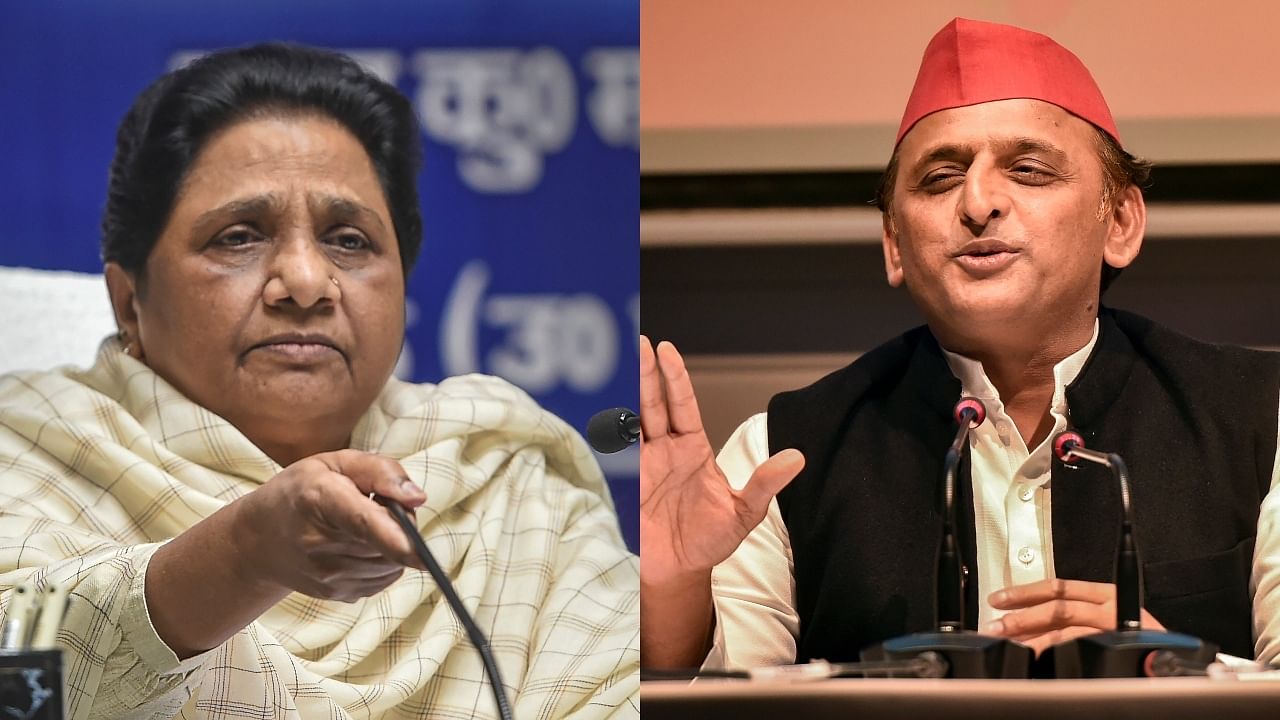
The Bharatiya Janata Party (BJP) leadership has come to rest hopes on the possibility of Mayawati-led Bahujan Samaj Party (BSP) halting Samajwadi Party (SP) chief Akhilesh Yadav's run to assume power in Lucknow. Mayawati may be only a shade of her former feisty self but retains her support base among Jatavs; the community comprises more than half of the Dalit population in the state.
At the peak of Prime Minister Narendra Modi and the BJP's popularity in the previous 2017 Assembly elections in Uttar Pradesh, the BSP's vote share was 26 per cent - dropping a mere four per cent from its vote share in the 2007 elections when elected to power with 30 per cent. On the other hand, the SP had clocked a vote share of 24 per cent in 2007, 29 per cent in 2012 and 22 per cent in 2017 - a drop of seven per cent from 2012, when it was elected to power. Thus, the big spike in the BJP vote share of 39.18 per cent in 2017 had primarily come at the expense of the Congress and other smaller parties, not as much at the cost of the SP and the BSP.
Mayawati can halt the SP juggernaut because of this reason. While the BJP had decimated all rival parties in 2017 in the 58 seats of western UP, scheduled to go for polls in the first phase, Mayawati's BSP was the runner up in 30 of these constituencies, while SP candidates were placed second in only 15 seats. Hence, the more Mayawati's BSP gains, the more extensive the damage to Akhilesh Yadav's SP.
What psephologists say
There is no denying that the SP-led coalition has rapidly emerged as the principal challenger to the BJP in India's most populous and politically significant state. According to a recent ABP/C-Voter survey, the BJP is expected to retain its vote share of 40 per cent but is forecasted to win between 223 to 235 seats - a drop of approximately 70 seats from 2017. With an expected vote share of 33.3 per cent, the SP is projected to win between 145 to 157 seats.
Two issues stand out about the survey report. First, with a bigger vote share for the BJP, how can the party get fewer seats than in 2017? Second, it has never been the case in UP that a party with nearly 30 per cent vote share does not form the government. When the BSP was elected to power in 2007, the party had a vote share of 30 per cent. In 2012, the SP had been elected to power with a vote share of 29 per cent.
Psephological projections can hardly be taken as an accurate barometer of existing ground realities. Still, the following appears reasonable: If there comes about a breach in the "Hindutva plus" strategy (the inclusion of the backwards and Dalits within the Hindutva umbrella), the BJP could be heading for trouble. A realisation of such sort appears to have also dawned upon BJP strategists' minds.
Caste overpowering Hindutva
The SP has emerged as the first port of call for leaders of the smaller caste-based parties and also ministers and MLAs belonging to the Other Backward Caste (OBC) communities, who have quit the BJP in past weeks to join the SP. Massive crowds have turned up at recent rallies addressed by Akhilesh Yadav at locations including Jaunpur, Lucknow and Kanpur.
Learning from past mistakes, Akhilesh Yadav has also made a conscious effort to broad-base the party's support base - reaching out to communities other than Yadavs and Muslims. At a recent meeting with leaders of SP's alliance partners, Krishna Patel of the Apna Dal faction was accorded the honour as the master of ceremonies, while Akhilesh Yadav himself sat among the other participants. Alliance leaders such as Om Prakash Rajbhar of the Suheldev Bhartiya Samaj Party and Keshav Dev Maurya of the Mahan Dal have been asked to lead the SP's Vijay Rath Yatras.
Akhilesh Yadav has also reached out to the Brahmin community by way of the "Parashuram Yatras" that the SP has conducted. He has also avoided directly attacking Prime Minister Narendra Modi, keeping his campaign themes focused on misgovernance and misrule of the Yogi Adityanath government, raising price rise, unemployment, Covid mismanagement and the Adityanath government's "thoko niti" (encounter policy). In short, Akhilesh Yadav has attempted to reinvent himself as a leader capable of taking everybody along.
BJP's dilemmas
For a party known for its planning and the hard work of its cadres - with access to unlimited resources, financial and other, the BJP appears to have suddenly and embarrassingly run out of ideas in UP.
Plans had been firmed up to field Adityanath from the Ayodhya constituency with apparent aims to overwhelm the resurgence of "Mandal politics" by the Hindutva wave. But Adityanath is now seen visiting the homes of Dalits, sharing meals with Dalit families. Union minister and BJP leader Dharmendra Pradhan also announced that the party would field Dalits from non-reserved seats as well. Prime Minister Modi has been on a ribbon-cutting and foundation stone laying drive, particularly in eastern UP, where caste identities are strong.
In the upcoming budget on February 1, Finance Minister Nirmala Sitharaman is likely to make populist announcements targeted at Dalit and backward welfare. Despite all this, this fear looms large in respect of the BJP's last hour change of strategy for Uttar Pradesh: That it might be a case of it being too little and too late.
(The writer is a journalist)
Disclaimer: The views expressed above are the author's own. They do not necessarily reflect the views of DH.